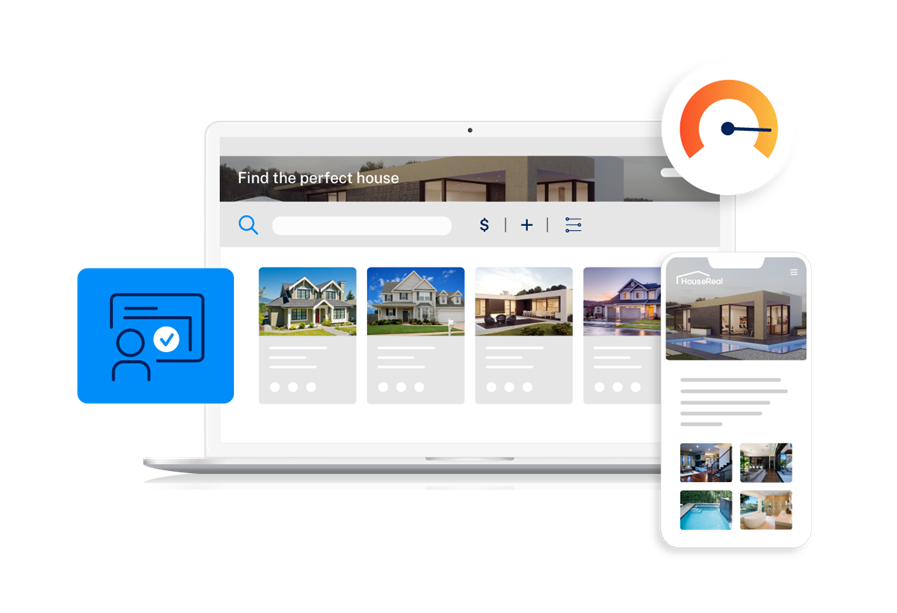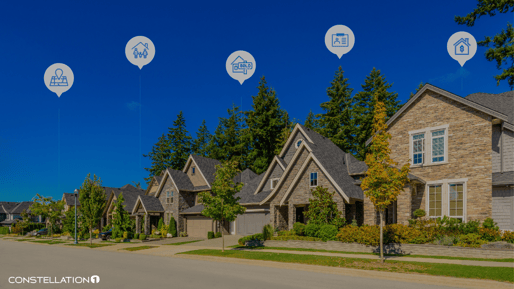Are data challenges preventing your proptech solution from scaling?
The Fed has raised interest rates four times this year, cooling one of the hottest real estate markets in recent memory. Despite the short-term slowdown, real estate experts are predicting that low inventory, high demand, and shifting consumer values will cause significant market appreciation in the coming years. This means big opportunities for proptech companies to create innovative products and services that make real estate transactions easier. And there’s one crucial ingredient needed to power all these innovations: data.
Real Estate Runs on Data
Real estate is one of the most data-driven sectors in the world. Every aspect of the industry is informed and powered by data. Without the right data at your fingertips, operating a proptech and effectively scaling in the real estate industry simply isn’t possible.
The entities that are responsible for generating and safeguarding all American real estate data are called multiple listing services, or MLSs. You can read more about how MLSs came to be at the previous link. MLSs are a uniquely American invention, and more than a century of history has created a patchwork of hundreds of separate MLSs across the continent, each with their own way of doing things. Due to the decentralized nature of the real estate industry in the United States, there is no single governing body for MLSs and no single way for them to work.

Thankfully, most MLSs follow a basic structure and serve their members in similar ways. Generally speaking, they are responsible for providing a variety of services to their members that facilitate real estate transactions.
Learn more about the history of MLSs and
how they work on our dedicated MLS page.
Managing multiple MLS relationships is time-consuming. Thankfully, there's a better way.
There are over 500 separate MLSs in the United States, each with its own unique way of doing things. This means to scale nationally, proptechs will need to potentially manage 500+ points of contact, contracts, and relationships.

This simply isn’t scalable, because doing it right takes a lot of time and effort. Establishing a relationship directly with just one MLS and spinning up a data feed can take weeks, which is precious time many scaling proptech companies can’t afford. This reality is an obstacle to agility.
To collaborate effectively with multiple MLSs, proptechs not only need to dedicate time to their relationships, but also to testing, QA, deployment, compliance, continuous updates, and support. And proptech companies are known for their innovation, not their in-house MLS expertise. Plus, managing MLS compliance is more complex the more MLSs you work with: each one has different rules, and if you break them, your data could be turned off.
This is why many proptech companies choose to work with a data expert like Constellation1 to set up agreements and manage MLS relationships on their behalf. It’s much faster and more efficient to work with an experienced company that already has relationships with the MLSs you want to work with.Why is MLS data so hard to manage?
The challenge of getting the data in the first place aside, getting that data to play well together takes even more time and effort. New entrants consistently underestimate the complexity of working with MLS data. The MLS ecosystem is a complex landscape that can challenge even the most motivated tech entrepreneurs who are trying to innovate and grow.
This is because each MLS collects data differently. They frequently have unique fields and set their own ranges and values. The result is 500-plus distinct data sets that must be standardized, cleansed, and combined to create the valuable resource tech companies need. For developers, that could mean dozens, if not hundreds, of hours of back-end work per feed, making fast scaling impossible.
Making MLS data work for you is hard,
but it’s also the fuel the real estate industry runs on
and the backbone of any proptech solution.
Without the right data, it’s impossible to serve the real estate space.
The Real Estate Standards Organization (RESO): what role does it play?
Not only do proptechs need to know how to work with MLSs and understand their different compliance rules, they also need to be aware of the Real Estate Standards Organization (RESO), an independent, not-for-profit organization, and its Data Dictionary. In 2002, RESO was officially created to define and promote the adoption and utilization of standards that drive efficiency and a streamlined real estate technology industry.
RESO’s Data Dictionary and compliance program are steps in the right direction towards making in-house data management easier. But despite the increased push for standardized data across the real estate landscape, there’s still a long way to go. Many MLSs strive for RESO compliance, but the degree to which they meet RESO standards can vary. Field names, ranges, data options, and more can all still be different, so data cleansing and normalization challenges remain. Learn more about the RESO Data Dictionary.
Why you can't ignore MLS compliance if you want to thrive in proptech
Compliance is a critical part of MLS relationship management that can cost precious time and strain your resources. Every MLS board sets rules for how its data can be used, and these rules can change often. Examples of these rules and regulations include what data is permitted for public display versus through a virtual office website (VOW) and how that data is displayed. The most recent NAR IDX Policy 7.58, which requires broker attribution with contact information for IDX listings, is another area of compliance and an example that proptech companies may not be aware of when entering the industry.
If the rules and regulations aren’t followed, the MLS can impose a fine. If the rules are consistently broken, MLSs can even turn their data streams off entirely. For proptech companies and their end customers, this would be catastrophic.
Don't let compliance violations turn off your data feeds.
Entrust your data management to an expert.
Access your MLS data shortcut and start scaling faster today with Constellation1
If your business means powering tech solutions for the real estate industry, data access equals growth. Partnering with a data aggregator is the shortcut you need to enter new markets, attract new customers, and grow revenue.
“Our MLS data challenges were eating up a huge amount of resources. Having a data access shortcut is huge.”
- Will Grewal, Co-Founder and CEO, HomeStack.
 Few companies have the years of experience, number of dedicated employees, and data quality we have at Constellation1. We know how to solve most data feed problems because we’ve seen them before during our 20+ years in the data business. Our team has 50+ years of combined experience solving data challenges, and we can solve them with you—together.
Few companies have the years of experience, number of dedicated employees, and data quality we have at Constellation1. We know how to solve most data feed problems because we’ve seen them before during our 20+ years in the data business. Our team has 50+ years of combined experience solving data challenges, and we can solve them with you—together.Constellation1 Data Services
United States:
©2025 Constellation Web Solutions, Inc | All Rights Reserved | Privacy Policy | Terms | Do Not Sell My Information




